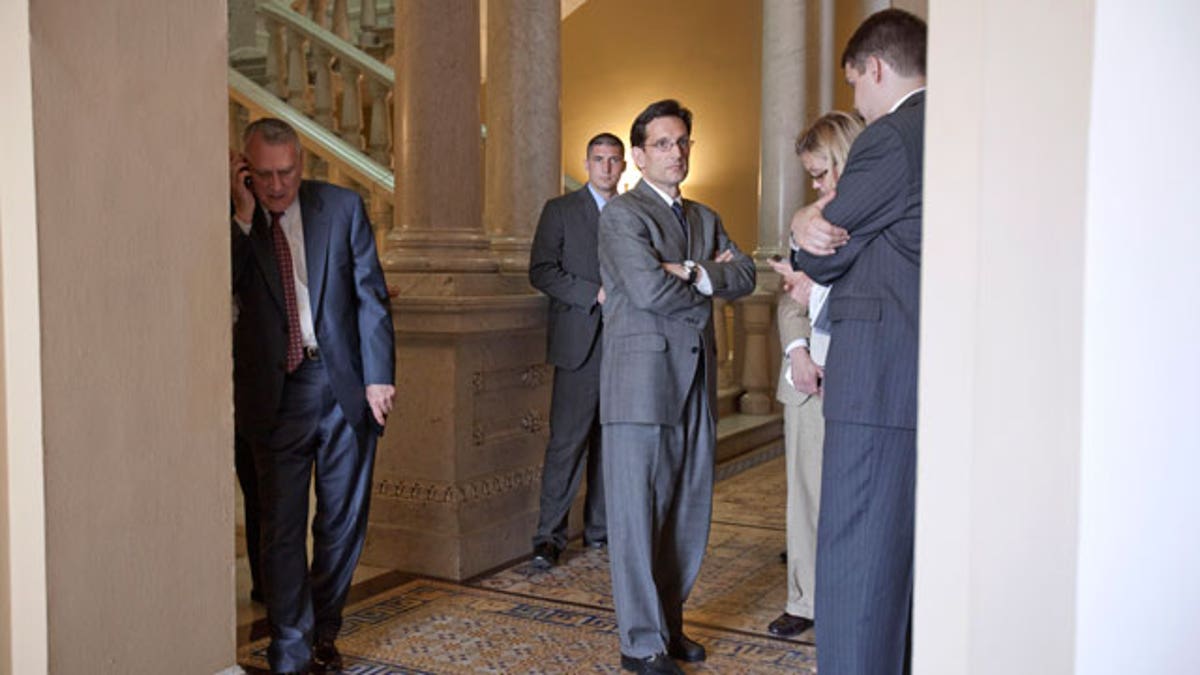
House Majority Leader Eric Cantor of Va., center, Senate Minority Leader Jon Kyl of Ariz., left, and others, are seen on Capitol Hill in Washington, Thursday, June 9, 2011, following a meeting on the debt ceiling. (AP)
As the clock ticks on raising the nation's debt ceiling to avoid a catastrophic default, Vice President Biden met with Republican negotiators on Thursday in another closed-door meeting that only showed how far apart both sides remained.
In the 2 1/2-hour meeting, the sixth one between the administration and a handful of top lawmakers, Biden and Treasury Secretary Timothy Geithner made a pitch for more revenue, but Republicans resolutely oppose anything that could be called a tax hike.
Both sides hope to pass the measure well before an estimated early August deadline to avoid what the Obama administration warns would be a first-ever, market-rattling default on U.S. obligations. With the debt ceiling raised, the government could then resume borrowing more than $100 billion a month to pay its bills.
With the talks moving slowly, negotiators agreed to pick up the pace, scheduling three meetings for next week. Taxes remain the biggest sticking point.
"Any balanced packaged has to end big loopholes, like subsidies for the oil and gas industry," said Rep. Chris Van Hollen, D-Md., who's one of two House Democrats participating in the talks. But asked whether Republicans are showing any willingness to consider tax increases, Van Hollen said, "I can't say that would be true, no."
Last month, Biden told reporters: "I've made it clear ... revenues have to be in the deal."
The White House push for revenues is noteworthy because Democrats will have to provide votes to get the final measure passed, since many Tea Party-backed House Republicans are likely to oppose any measure to increase the debt limit. The vote is already so unpalatable for Republicans that it's difficult to imagine GOP negotiators going along with new taxes and risk the wrath of the Tea Party and anti-tax activists, like Grover Norquist -- even Democrats offer up larger spending cuts.
Majority Leader Eric Cantor of Virginia, who's representing House Republicans in the talks, told the administration flat out that tax increases can't pass the GOP-controlled House.
For their part, Republicans have complicated the talks with a demand that any increase in the government's borrowing limit be matched with spending cuts of equal or greater size -- though the cuts could tally over the next decade or more. But under current estimates it'll take at least $2.4 trillion in new borrowing simply to keep the government afloat until 2013 and guarantee that lawmakers wouldn't have to cast another politically toxic vote before next year's elections.
There's no sign the negotiators are discussing cuts of that magnitude; Biden has said he thinks the group can come up with more than $1 trillion in deficit savings.
And Senate GOP Leader Mitch McConnell of Kentucky has vowed that any pact that wins his vote -- a decisive one -- will have to wring savings from Medicare. Republican talk of defending the politically popular program, however, is already emerging as a hot button issue in Democratic efforts to retake the House and keep control of the Senate.
Negotiators say the meetings have been constructive, but no agreements are in place despite calls by both President Obama and House Speaker John Boehner, R-Ohio, for a market-soothing pact by early July. That duo is critical to any successful negotiation. The two haven't had any substantive discussions so far, though they are scheduled to play golf June 18.
Cantor said meeting next week would demonstrate "if we can get a result." He seemed more confident earlier this week when he sent an email to House GOP lawmakers that said he was "cautiously optimistic" that the ongoing talks would produce an agreement on budget cuts at least as large as the accompanying increase in the government's ability to borrow.
Cantor and Sen. Jon Kyl, R-Ariz., are keeping the focus on spending cuts.
"We believe that many of the problems surrounding the lack of job creation and growth in this country have to do with the fact that there isn't a credible plan to manage down the debt and deficit in this country," Cantor said.
Biden left the meeting Thursday without making any comment.
The Associated Press contributed to this report.




